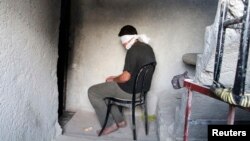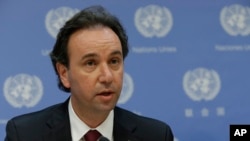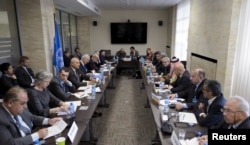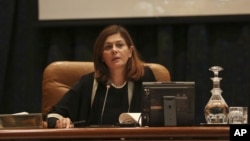Syrian opposition activists are urging the United Nations and the international community to push for the release of tens of thousands of detainees in Syria, calling it critical in efforts to revive the moribund peace process.
A delegation of representatives of the Syrian Opposition’s High Negotiations Committee has been meeting with U.N. Special Envoy for Syria, Staffan de Mistura’s team to demand real and tangible progress on this issue.
This is not the first time the group has broached this subject. Former president of the National Coalition for Syrian Revolutionary and Opposition Forces Khaled Khoja told VOA that the release of detainees in Syria was a crucial confidence-building measure in the peace process.
He said resolving this issue would improve the atmosphere around the negotiating table.
“Making progress in this file, the detainees file will help us to improve the negotiation process and shift toward political solution with the other confidence-building measures like breaking the siege and providing humanitarian aid for the Syrian people.”
United Nations efforts to send relief convoys of food, medicine and other essentials to more than one million people trapped in 19 besieged areas in Syria have met with minimal success in the past months.
The U.N. has been particularly frustrated in its attempts to send humanitarian convoys to help some 275,000 people in the northern Syrian city of Aleppo, which has been under relentless bombardment by Syrian government, Russian and rebel forces for weeks.
Leverage to restart political process
Khoja said the delivery of aid to Aleppo, Damascus and other besieged areas, as well as the release of the detainees “will be leverage to relaunch the political process again and start talking about political solutions.”
The Syrian Network for Human Rights, an independent, neutral, non-governmental organization has documented more than 110,000 Syrian detainees. It found that most - 91,000, including more than 2,700 children and nearly 5,700 women, were being held by the government of Bashar al-Assad.
More than 11,000 others were under the control of Islamic State militants, opposition forces, the PYD Kurds, and the Al-Nusra front. The Network, which employs 24 staff and about 17 volunteers in Syria, said that 75 percent of the detainees were considered as enforced disappearances.
The group’s founder, Fadel Abdul Ghani, explained the warring factions “deny any knowledge of them. They deny holding them.”
He said his group believed that twice as many people as those already documented actually have been killed or disappeared. He said investigators on the ground were in the process of recording their names and other vital data with families and friends.
In the meantime, he told VOA that the struggle to prevent arbitrary detentions and to achieve the freedom of the detainees was continuing.
“Above the ground, we have shelling and bombing from the airplanes and from rockets and under the ground and inside the centers of detention, we have torture and we have starvation until death.”
Ghani said the Syrian Network has documented a monthly average of 50 to 60 cases of detainees being tortured to death. He accused Syrian President Assad of using the detainee issue as leverage to get his way in peace negotiations.
Gateway to peace
Member of the High Negotiations Committee Hind Kabawat said resolving the detainee problem would be a gateway to peace. She said it was essential that families learn the fate of their loved ones for the process to move forward.
“It is a big problem and we need to solve it. We need to give comfort for those families to say we are thinking about them. We need to do something. And there will be hope to know where their family members are.”
Kabawat, who is an attorney and assistant Professor at George Mason University in the U.S. state of Virginia said a future political solution for Syria and for transitional justice was dependent upon accountability.
“War crimes have to be punished. And, we need to know… where are our detainees, what is happening to them. And we need to get concrete answers of what we can do for the future of Syria to have a just peace,” Kabawat said.
Since the outbreak of Syria’s civil war in March 2011, about one quarter of a million people have been killed and half of Syria’s population of 23 million have become displaced within Syria and as refugees in other countries.
Members of the Syrian Opposition blame Russia’s alliance with Syrian President Assad for prolonging the war and leading Assad to believe that he could win the war militarily.
They said as long as Russia’s escalation of air raids on Aleppo continued and civilians continued to die from indiscriminate bombing it was not possible to talk about a peaceful solution to this bloody war.
UN, US singled out for criticism
Khaled Khoja criticized the United States “for letting the Russians” lead the initiative and the United Nations for just “monitoring the process.”
He said as long as that continued “we cannot talk about any improvement in the political process. Actually, the Syrian crisis has become an international crisis and it needs an international approach.”
He said the regional and international countries have to accept responsibility for their part in exacerbating the war. Additionally, he said “they bear responsibility to stop the bloodshed in Syria and help push the peaceful solution forward.”
He said this meant putting pressure on Russia, whether through the Security Council, imposing economic sanctions or by other means “to prevent Russia from committing more war crimes inside Syria.”







